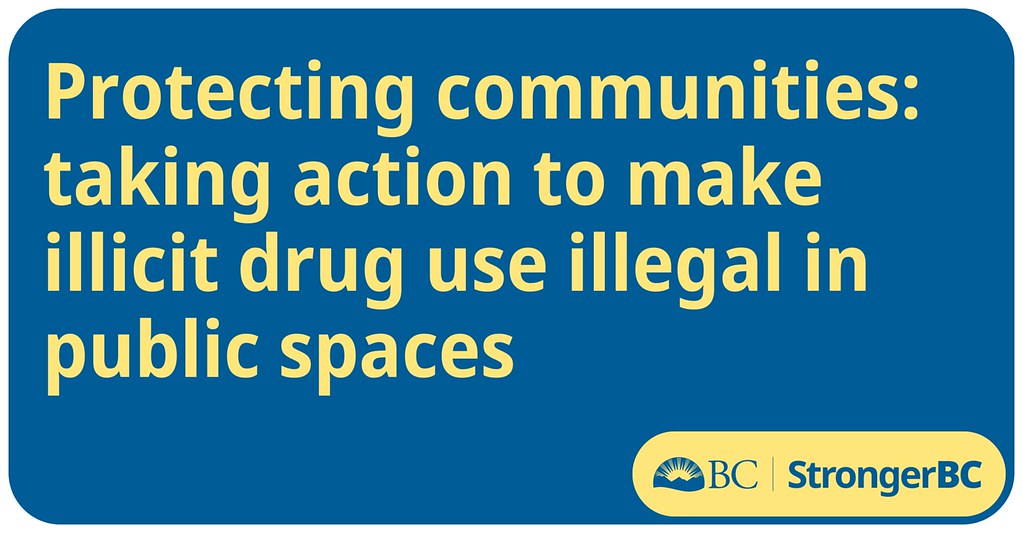B.C. moves to ban drug use in public spaces, taking more steps to keep people safe
B.C. is taking action to make illicit drug use illegal in all public spaces, including inside hospitals, on transit and in parks.
It’s part of several new measures introduced by the Province, focused on providing police with more tools to address public safety while offering support and access to treatment for people living with addictions.
“Keeping people safe is our highest priority. While we are caring and compassionate for those struggling with addiction, we do not accept street disorder that makes communities feel unsafe,” said Premier David Eby. “We’re taking action to make sure police have the tools they need to ensure safe and comfortable communities for everyone as we expand treatment options so people can stay alive and get better.”
The Province is working with the federal government to make changes to the legality of possessing drugs in B.C. This will provide police with the power to enforce against drug use in all public places, including hospitals, restaurants, transit, parks and beaches. Guidance will be given to police to only arrest for simple possession of illicit drugs in exceptional circumstances.
When police are called to a scene where illegal and dangerous drug use is taking place, they will have the ability to compel the person to leave the area, seize the drugs when necessary or arrest the person, if required.
This change would not recriminalize drug possession in a private residence or place where someone is legally sheltering, or at overdose prevention sites and drug checking locations.
“Our communities are facing big challenges. People are dying from deadly street drugs and we see the issues with public use and disorder on our streets,” said Mike Farnworth, Minister of Public Safety and Solicitor General. “As we continue to go after the gangs and organized criminals who are making and trafficking toxic drugs, we’re taking action now to make it illegal to use drugs in public spaces, and to expand access to treatment to help people who need it most.”
The government will also improve safety and security for patients, visitors and health-care workers in hospitals. This includes a single policy prohibiting street-drug possession or use and additional measures to increase enforcement, support patients with addictions, and encourage them toward treatment and recovery.
Going forward, when patients are admitted to hospital, they will be asked if they experience any substance-use challenges. Patients will receive active support and medical oversight for addiction care to ensure people with addictions receive personalized care while their medical issues are being treated in hospital.
“Today, we are taking immediate action to make hospitals safer and ensuring policies are consistent and strictly enforced through additional security, public communication and staff supports,” said Adrian Dix, Minister of Health. “The action plan launching today will improve how patients with addictions are supported while they need hospital care, while preventing others from being exposed to the second-hand effects of illicit drug use.”
The Province is also expanding access to treatment for people struggling with addiction, including those who are most at risk of overdose by:
- increasing the availability and accessibility of opioid-agonist treatment (OAT), a medication-assisted treatment for people who have an opioid-use disorder, by implementing a provincewide virtual system;
- integrating addictions services with health care, housing and related services; and
- working with experts to develop methods to track prescribed alternatives with the aim of identifying and preventing diversion.
“People across the country are dying from poisoned drugs and B.C. is no exception,” said Jennifer Whiteside, Minister of Mental Health and Addictions. “Addiction is a health-care issue, not a criminal one, and we’re going to keep doing everything we can to save lives and connect people to treatment.”
Government is also investing $25 million to support and expand the Hope to Health Research and Innovation Centre located in Vancouver’s Downtown Eastside, to provide intensive primary care and other services to more people with highly complex medical and psychosocial needs. The innovative Hope to Health model of care is led by Dr. Julio Montaner, a world-recognized physician and researcher in HIV, and in the provision of comprehensive care to vulnerable and marginalized populations. This initiative will lay the foundation for potential expansion to other communities in B.C.
Quick Facts:
- B.C.’s three-year exemption under section 56(1) of the Controlled Drugs and Substances Act to decriminalize people who use drugs was first requested on Nov. 1, 2021, and enacted on Jan. 31, 2023.
- Since 2017, the Province has opened 600 publicly funded substance-use treatment beds throughout B.C.
- Since 2019, the Province has invested $35 million to support 49 community counselling agencies provincewide, and more than 250,000 free or low-cost counselling sessions have been delivered to individuals, couples and families.
- There are currently 50 overdose prevention sites around the province to provide people who use drugs with the tools and supports they need to use safely and connect to care.
- Almost half (24) of these sites provide inhalation services.


























